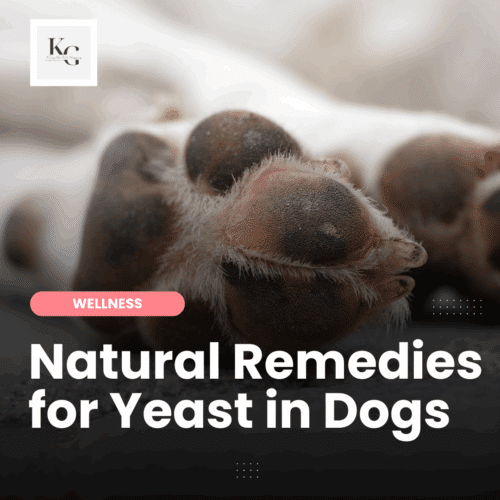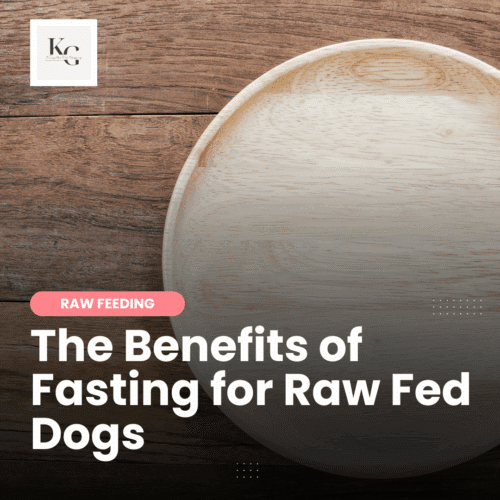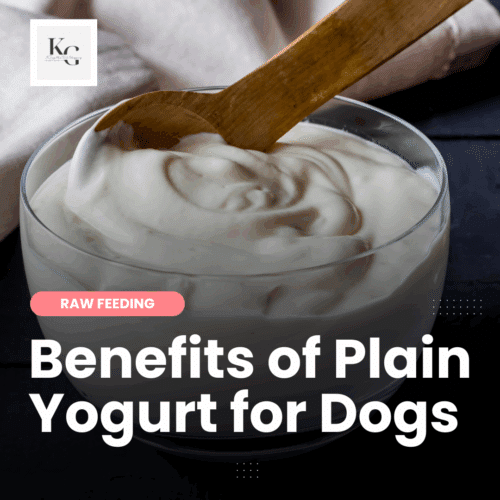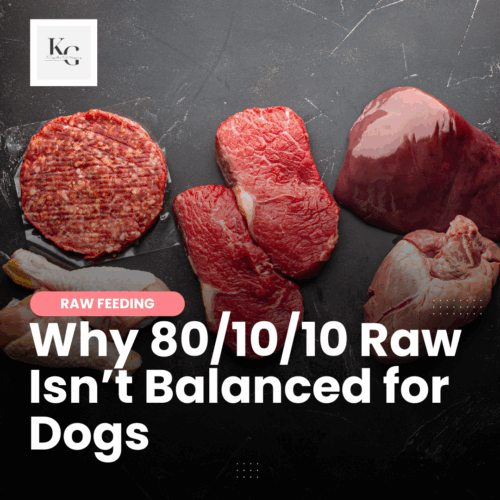Keep the Tail Wagging is supported by pet parents. I occasionally earn a commission (at no additional cost to you) when you click through an affiliate link to one of my favorite products. Thank you for your support. Read More
I was introduced raw goat's milk and kefir when I began feeding raw. I was surprised to learn that dogs can enjoy dairy products beyond hiding a pill in string cheese, and as I learned more about the benefits of raw goat's milk and kefir, I began alternating them into my dogs' diet. Recently, social media was abuzz of the news that raw goat's milk isn't good for dogs and raw feeders should feed pasteurized milk instead. While I respect each dog owner's right to feed their pets as they deem appropriate, I may have an opinion. Personally, I think feeding pasteurized milk to my dogs can lead to more health issues. I'm already doing my best to raise the next Forever Dogs, I can't imagine taking away a fresh food that plays a significant role on this journey.
All About Raw Goat's Milk for Dogs
Raw goat's milk comes directly from goats without undergoing pasteurization or homogenization. It is consumed in its natural, unprocessed state. Some believe raw goat's milk has health benefits, such as being easier to digest (due to lower lactose levels), containing beneficial bacteria for gut health, and being rich in vitamins, minerals, and proteins. However, some have raised concerns that raw milk can also carry a risk of harmful bacteria, which makes it important to buy from trustworthy producers.
Raw Goat's Milk and Lactose
Raw goat's milk generally contains lower lactose levels than raw cow's milk. This makes raw goat's milk easier to digest for some dogs, who are said to be genrally lactose intolerant, or have difficulty digesting cow's milk. Goat's milk typically has smaller fat globules and higher levels of specific fatty acids, making it easier to break down in the digestive system. However, it is important to note that lactose intolerance varies among individuals, and some may still experience issues with goat's milk if they are severely lactose intolerant.
Raw Goat's Milk and Fatty Acids
Raw goat's milk contains various fatty acids that are beneficial for health. Some of the fatty acids found in raw goat's milk include:
- Medium-chain fatty acids (MCFAs) are easily digestible and believed to have various health benefits, including being a quick energy source and potentially supporting weight management.
- Omega-3 fatty acids have anti-inflammatory properties and are important for heart health, skin & coat health, immune system, brain function, and overall well-being.
- Conjugated linoleic acid (CLA) is associated with weight management, reducing inflammation, and improving metabolic health.
- Oleic acid is a monounsaturated fatty acid known for its potential to support heart health and reduce inflammation.
Raw Goat's Milk and Gut Health
Raw goat's milk supports gut health through various mechanisms:
- Probiotics: Raw goat's milk contains beneficial bacteria that are naturally present, which can help maintain a healthy gut flora balance. These probiotics can support digestion, nutrient absorption, and overall gut health.
- Easier digestion: Goat's milk proteins are smaller and form a softer curd in the stomach compared to cow's milk proteins. This makes goat's milk easier for dogs to digest, as they are known to have an intolerance to cow's milk.
- Anti-inflammatory properties: Some components of raw goat's milk, such as certain fatty acids (e.g., omega-3 fatty acids), have anti-inflammatory properties that help reduce inflammation in the gut and promote a healthier digestive system.
- Rich in nutrients: Raw goat's milk is rich in vitamins, minerals, proteins, and other nutrients essential for maintaining gut health and overall well-being.
While raw goat's milk offers several benefits for gut health, individual responses may vary. I always start small and gradually build with dogs new to raw goat's milk.
Nutrients in Raw Goat's Milk
Raw goat's milk is a nutritious part of my dogs' diet and contains various essential nutrients that offer numerous health benefits. Here are some key nutrients found in raw goat's milk and their potential benefits:
- Protein: Essential for building and repairing tissues, supporting muscle growth, and maintaining a healthy immune system.
- Calcium: Important for building and maintaining strong bones and teeth and supporting muscle function and nerve transmission.
- Vitamin D: Helps the body absorb calcium and supports bone health, immune function, and overall well-being.
- Vitamin A: Essential for vision, immune function, skin health, and cell growth.
- Vitamin B12: Supports red blood cell formation, neurological function, and DNA synthesis.
- Riboflavin (Vitamin B2): Helps convert food into energy, supports red blood cell production, and plays a role in growth and development.
- Phosphorus: Works with calcium to build strong bones and teeth, supports energy production, and is essential for cell function.
- Potassium: Important for maintaining fluid balance, supporting muscle function, and regulating blood pressure.
- Magnesium: Supports muscle and nerve function, bone health, and energy production.
- Fatty acids (e.g., omega-3, MCFAs, CLA): Provide energy, support heart health, reduce inflammation, and may have various other health benefits.
These nutrients in raw goat's milk contribute to overall health and well-being, making it a nutritious option for my dogs.
Adding Raw Goat's Milk to a Dog's Diet
There are several plain and blended (with berries, pumpkin, vegetables) options available for dogs. I source raw goat's milk from two brands. One is plain, the other is fermented and has additional, natural ingredients.
I like to add raw goat's milk to my dogs' bowls at least twice weekly. I do this with a meal topper or by giving my dogs a modified fasting day.
Meal Topper: a small amount can be poured over a meal, or if one has access to the proper equipment, a freeze-dried powder can be created as a meal topper.
Modified Fasting Day: if fasting isn't possible or desired, feeding a meal of raw goat's milk is an option. I feed my dogs a cup (or so) of raw goat's milk, sometimes adding a raw egg yolk and an air-dried organ blend topper.
- Real Dog Box; organ blend meal toppers are available to members through a Secret Shop
- Northwest Naturals Functional Toppers; there are several recipes available
I primarily source raw goat's milk from Solutions Pet Products and Green JuJu Kitchen.
Risks of Feeding Raw Goat's Milk
While raw goat's milk can provide various nutrients and potential health benefits, some feel it also poses certain risks due to the possible presence of harmful bacteria, pathogens, and contaminants. Some of the risks associated with drinking raw goat's milk include:
- Bacterial contamination: Raw milk, including raw goat's milk, can contain harmful bacteria such as E. coli, Salmonella, Listeria, and Campylobacter. These bacteria can cause foodborne illnesses such as diarrhea, vomiting, fever, and, in severe cases, more serious complications.
- Parasitic infections: Raw goat's milk may contain parasites such as Cryptosporidium and Giardia, which can cause gastrointestinal infections and other health problems.
- Allergic reactions: Some dogs may be allergic to components in raw goat's milk, such as proteins or lactose, which can lead to allergic reactions ranging from mild to severe.
- Unpasteurized milk risks: Raw goat's milk has not undergone pasteurization, which involves heating the milk to kill harmful bacteria. Without pasteurization, the risk of bacterial contamination and foodborne illnesses is higher.
- Vulnerable populations: Dogs with weakened immune systems are at higher risk of developing severe complications from consuming raw milk due to their increased susceptibility to infections.
After more than a decade of feeding raw goat's milk and kefir to my dogs, I haven't experienced any of these risks, nor have I heard stories of dogs succumbing to bacteria, parasites, or allergic reactions. My success may be due to sourcing – I only buy raw goat's milk and kefir from trusted, ethical brands:
- Solutions Pet Products (recommended)
- Green Juju (recommended)
- Steve's Real Food
- OC Raw
- Primal Pet Foods
Pasteurized Goat's Milk = Oxidation
While pasteurized goat's milk may seem like a safer choice for dogs, I personally do not feel comfortable feeding it to my pets. The primary concern is that the pasteurization process, which involves heating the milk, causes oxidation of the fats contained in it. Research on the effects of oxidized fats in animals has shown links to brain cell damage, inflammation, and a heightened risk of diabetes and cardiovascular disease. Studies have linked oxidized fats to increased risk of pancreatitis and digestive upset.
Fats are Healthy & Necessary
Fats are a healthy and necessary ingredient for optimal health when consumed raw. They support skin & coat health, gut health and the immune system, act as a source of energy, and boost nutrient absorption. Heating fats degrades certain nutrients, making the product less nutritious. Heat doesn't degrade ALL of the nutrients in food. While the pasteurization process is conducted at a lower-heat for 15 to 20 seconds to kill bacteria, I couldn't only find information that stated there is minimal oxidation, not that there is zero oxidation.
Oxidation Leads to Chronic Inflammation
I prefer to avoid any oxidation in my dogs' diet as possible because chronic inflammation leads to many health issues, including tissue damage, autoimmune disorders, chronic disease (including cardiovascular disease, diabetes, cancer, and neurodegenerative disorders), and impaired healing.
The Benefits of Lactoferrin
Lactoferrin is a multifunctional glycoprotein found in milk and it's especially high in Green JuJu raw goat's milk. It offers several health benefits due to its unique properties:
- Immune support: Lactoferrin has antimicrobial properties that help inhibit the growth of bacteria, viruses, and fungi, thereby supporting the immune system's defense against infections.
- Anti-inflammatory effects: Lactoferrin possesses anti-inflammatory properties that can help reduce inflammation in the body, potentially benefiting conditions related to inflammation.
- Iron-binding capacity: Lactoferrin binds to iron, limiting the availability of this essential mineral to pathogens, thereby helping to inhibit their growth and replication.
- Gut health support: Lactoferrin plays a role in maintaining gut health by promoting the growth of beneficial bacteria in the gut microbiome and supporting a healthy balance of intestinal flora.
- Wound healing: Lactoferrin has been shown to promote wound healing by enhancing the body's defense mechanisms and aiding in tissue repair processes.
- Antioxidant activity: Lactoferrin exhibits antioxidant properties, helping to scavenge free radicals and reduce oxidative stress, which is beneficial for overall health and aging-related issues.
- Anti-cancer potential: Some studies suggest that lactoferrin may possess anti-cancer properties by inhibiting the growth of cancer cells and promoting apoptosis (cell death) in certain types of cancer.
These benefits make lactoferrin a valuable supplement for supporting various aspects of health, including immune function, gut health, wound healing, and inflammation. Incorporating lactoferrin-rich foods, like raw goat's milk, into my dogs' diet will help promote overall well-being.
Pasteurization is done at low temps for up to 15 seconds, I don't know if this consistent across all products/brands. My research revealed that pasteurization significantly reduces the level of lactoferrin in milk, meaning that the heat treatment process used in pasteurization partially destroys or denatures this protein, lowering its concentration in the final product; this is particularly true with longer heating times or higher temperatures used in the pasteurization process.
All About Kefir for Dogs
Kefir is a fermented milk drink made by adding kefir grains to milk and allowing the mixture to ferment for a period of time. Kefir grains are not traditional grains but rather a combination of lactic acid bacteria and yeast that form a symbiotic culture. During fermentation, the kefir grains metabolize the sugars in the milk, producing lactic acid, carbon dioxide, alcohol, and various beneficial compounds.
Kefir has a tangy flavor and a slightly effervescent texture, similar to a thin yogurt drink. It is known for its probiotic properties, as it contains a wide variety of beneficial bacteria and yeast strains that can have positive effects on gut health. Some potential health benefits of consuming kefir include:
- Probiotic support: Kefir is rich in probiotics, which are beneficial microorganisms that can support digestive health by promoting a healthy balance of gut bacteria.
- Improved digestion: The probiotics in kefir may help improve digestion, alleviate symptoms of irritable bowel syndrome (IBS), and reduce bloating and gas.
- Enhanced immune function: The probiotics in kefir can support immune health by enhancing the body's immune response and promoting a healthy gut microbiome.
- Nutrient absorption: Consuming kefir may improve the absorption of certain nutrients from food, such as calcium, due to its probiotic content.
- Anti-inflammatory properties: Some studies suggest that kefir may have anti-inflammatory effects, which could potentially benefit individuals with inflammatory conditions.
Kefir is available in various forms, including milk-based kefir, water kefir (made with sugar water or coconut water), and non-dairy kefir made from plant-based milk alternatives. It can be fed on its own or as a meal topper.
Easy Kefir Recipe without Grains
Not all pet food companies offer kefir and I read that it's easy to make. A friend gave me a simple recipe that doesn't require kefir grains that works every time. When I get to one cup of kefir, I divide it between several 16-ounce bottles, filling the remainder of the container with raw goat's milk. Within 24 to 36 hours, I have several bottles of kefir (it's actually yogurt since I'm not creating kefir grains).
I either feed the kefir right away, refrigerate it for up to two weeks, or freeze it.
I feed kefir the same as raw goat's milk, with the exception of the amount. Because kefir is thicker, I usually add 1/2 to 3/4 cup to my dogs' meals on modified fasting days.
Making Kefir with Grains
If you'd prefer to use starter grains, add the grains to the milk, leaving space at the top of the container. Although you can use any milk, use whole milk when making kefir.
- Cover the jar with a cloth, coffee filter, coffee filter, or paper towel and secure it with a rubber band or canning lid.
- Let the mixture sit at room temperature for 12–48 hours, or until the milk thickens and tastes tangy. The ideal temperature is between 68–78 F (20-25.5 C).
- Strain the kefir through a sieve or colander into a jug or bottle. The grains will be left in the strainer.
- The kefir grains can be saved to make more batches of kefir. The grains will multiply over time, so you can add more milk or remove some grains. You can also store the grains in the fridge in a glass jar covered with milk.
To store kefir grains when not in use, the best method is to rinse them thoroughly, then place them in a sugar solution (like a small amount of sugar dissolved in filtered water) and store in the refrigerator for short breaks; for longer periods, you can either dry them completely and store in an airtight container in the fridge, or freeze them in a sealed bag with a small amount of powdered milk to prevent freezer burn
Final Thoughts on Raw Goat's Milk for Dogs
While there may be many scientists and doctors who disagree with feeding raw milk to dogs, I have searched for studies specific to dogs and have come up short. Dogs can handle bacteria better than humans. And, in some cases, a dog with a compromised immune system can still thrive on a raw diet and raw goat's milk. It's important to do additional research when someone uses an authority figure (doctor, celebrity, influencer) to support a claim without providing additional evidence or reasoning to support the claim. This helps me better understands all sides of a topic, allowing me to make an informed choice for my dogs.
When I began reading about raw goat's milk again, I came to the conclusion that the benefits far outweigh the risks.





